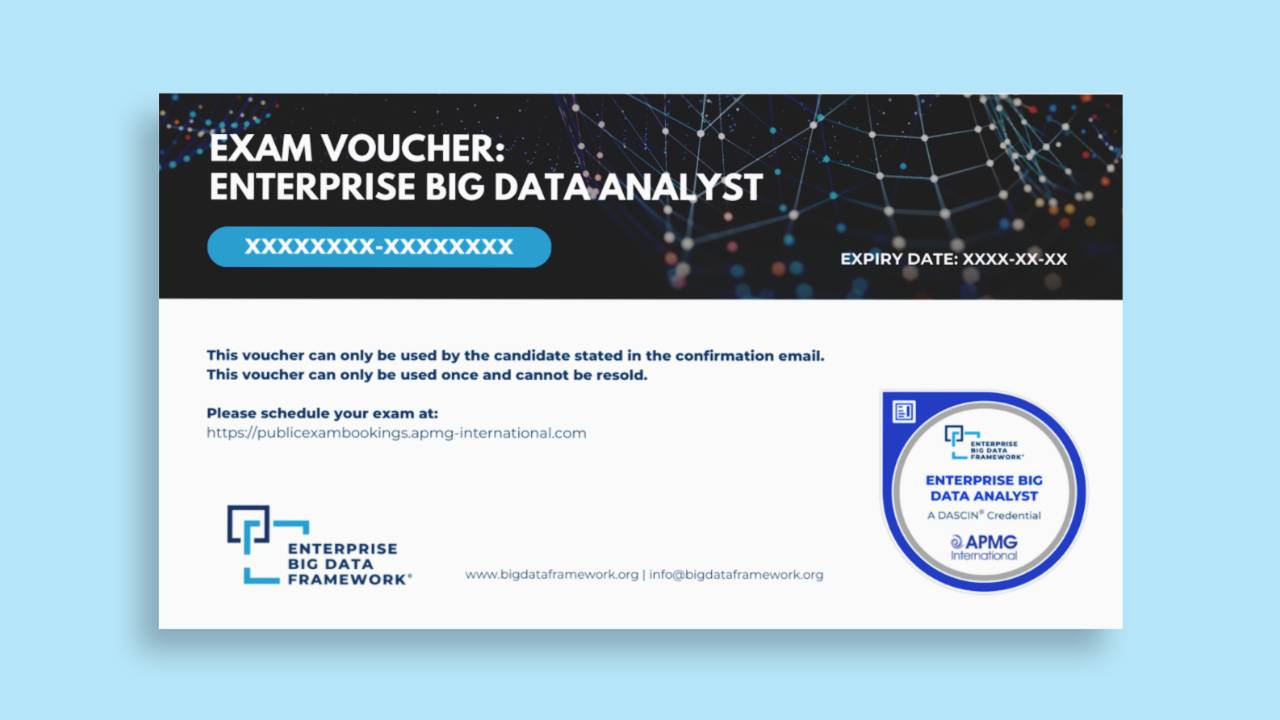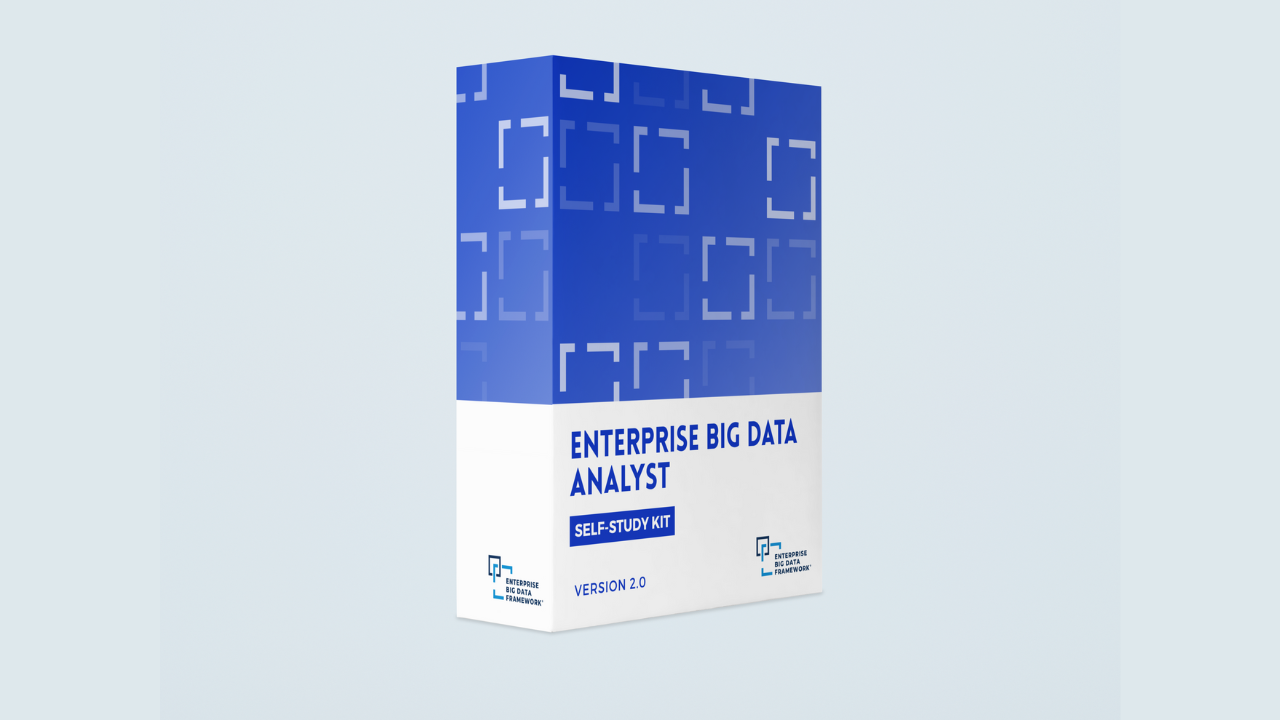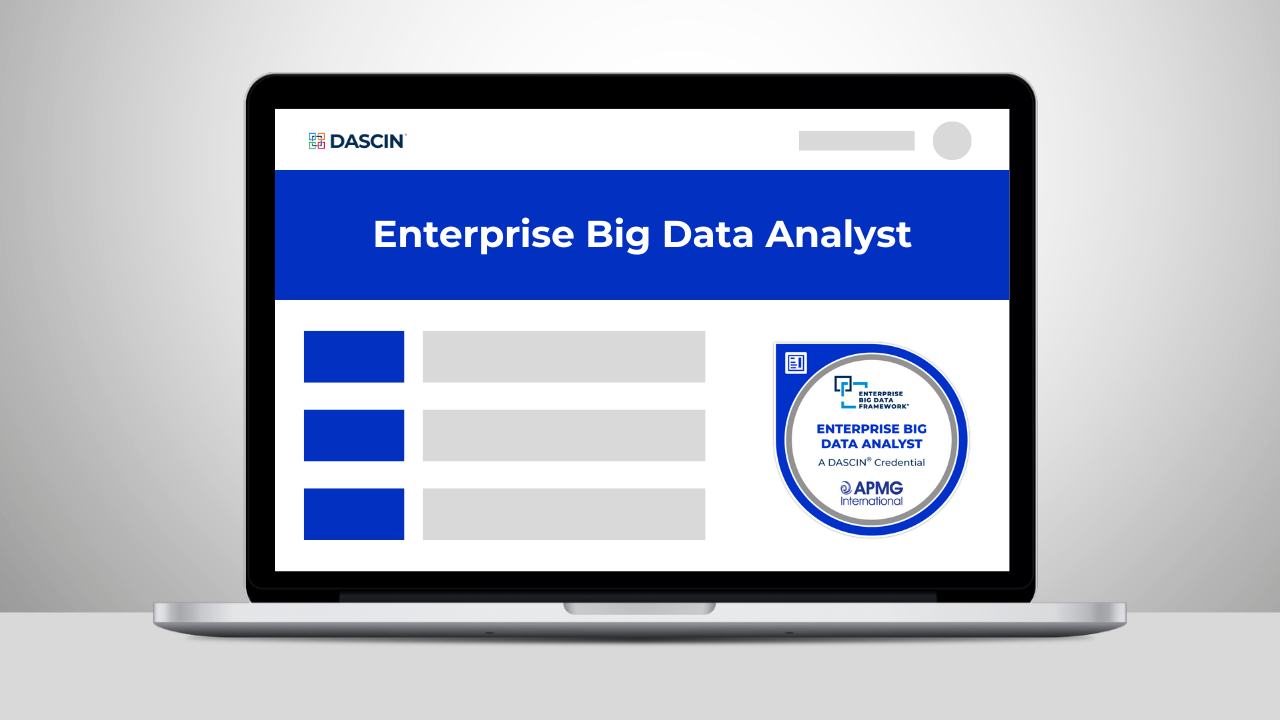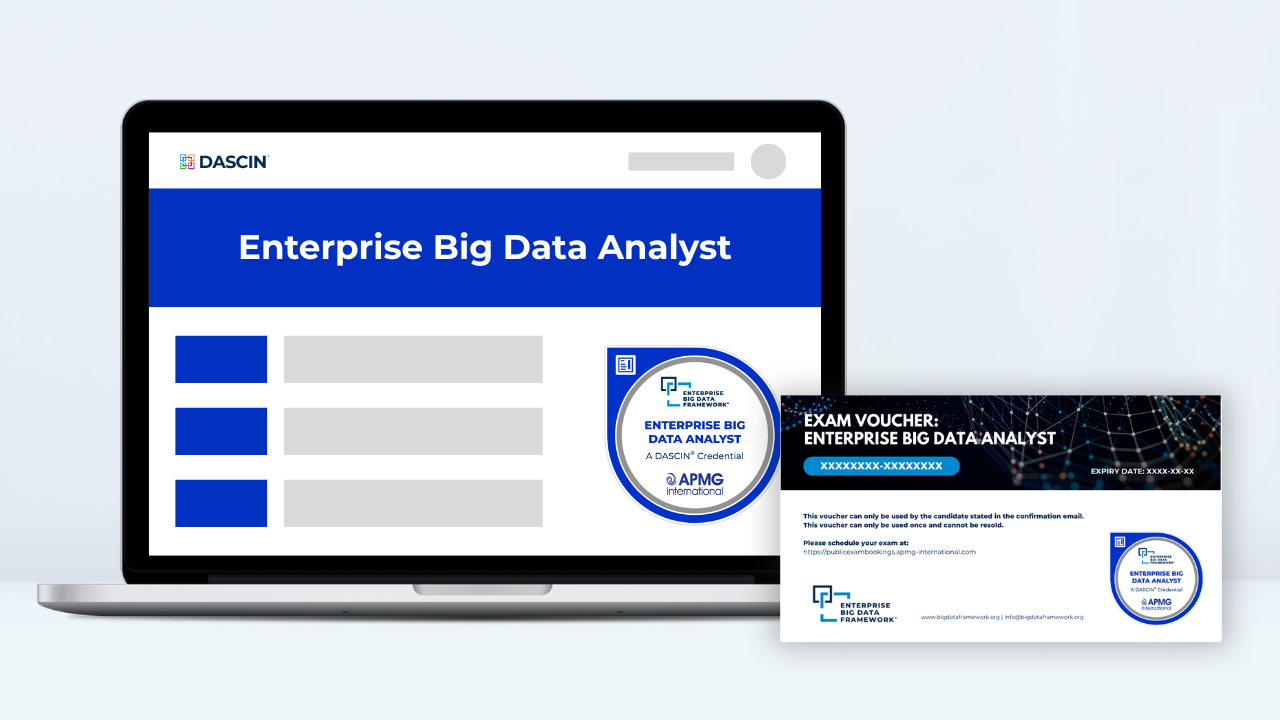Course Summary
The Enterprise Big Data Analyst (EBDA®) course equips participants with advanced techniques for analyzing and extracting value from Big Data. Designed for data professionals, this course delves into statistical methods, machine learning algorithms, and reproducible data analysis practices. Participants will explore foundational and advanced concepts like exploratory data analysis, statistical inference, predictive modeling, classification, and clustering, with practical demonstrations using the R programming language.
As a key offering in the globally accredited Big Data Framework curriculum, the EBDA® course emphasizes structured, vendor-neutral approaches to Big Data analysis. Learners will gain a strong theoretical understanding of the algorithms used in Big Data, complemented by practical applications. While programming skills are not assessed, participants are expected to interpret outputs from Python or R to derive actionable insights from their analyses. This course highlights best practices for retrieving value from data while ensuring reproducibility and accuracy.
The EBDA® certification positions learners to excel in the fast-growing field of Big Data. With the increasing demand for skilled analysts, this qualification provides essential knowledge and tools to navigate complex datasets confidently. Upon completing the course, participants will be well-prepared to pass the Enterprise Big Data Analyst certification exam and apply their skills to real-world data challenges effectively.
detailed course Information
The Enterprise Big Data Analyst (EBDA®) course equips participants with advanced knowledge of Big Data analysis concepts, algorithms, and their practical application. Graduates of the course will have the skills to interpret complex datasets accurately and draw meaningful conclusions to address real-world business challenges.
Certified Enterprise Big Data Analysts possess proficiency in key analytical models and methodologies essential for day-to-day data analysis. They understand the theoretical distinctions between various statistical and machine learning techniques, can articulate these differences, and apply the most appropriate model to solve specific business problems effectively.
This course prepares participants to:
- Comprehend and articulate the enterprise Big Data analysis process, including all critical steps involved.
- Differentiate between various data sources (e.g., local files, online datasets, and databases) and import them correctly for analysis.
- Execute fundamental data cleaning operations and understand the differences among various cleaning techniques.
- Perform essential data wrangling tasks and distinguish between key data transformation techniques.
- Conduct exploratory data analysis (EDA) to support model development, validation, and visualization.
- Apply core statistical inference methods, including hypothesis testing, to derive insights.
- Develop and interpret predictive models using statistical techniques such as correlation and simple linear regression.
- Formulate and evaluate machine learning models for classification, including K-Nearest Neighbors, Naïve Bayes, Logistic Regression, and Classification Trees.
- Implement clustering techniques, such as Hierarchical Clustering and K-Means, to identify patterns in data.
- Detect anomalies using advanced outlier detection methods like Grubbs’ Test and K-NN Outlier Detection.
- Present analytical findings effectively using codebooks and visualizations to communicate insights to stakeholders clearly and concisely.
By completing this course, participants will gain the expertise needed to excel as Big Data Analysts and successfully achieve the EBDA® certification.
This course is structured into 10 modules, each designed to build the skills required to become a proficient Enterprise Big Data Analyst. Each module covers key concepts, techniques, and tools necessary for effective data analysis in a Big Data environment.
Module 1: Introduction to Big Data Analysis
- Overview of Big Data and its significance
- Key concepts and terminologies in Big Data
- The data analysis process from data acquisition to insights
Module 2: Data Sources and Data Import Techniques
- Types of data sources: local, online, and database connections
- Data import techniques for structured and unstructured data
- Data extraction tools and APIs
Module 3: Data Cleaning Fundamentals
- Identifying and handling missing or inconsistent data
- Techniques for data imputation and normalization
- Data transformation and cleaning best practices
Module 4: Data Wrangling and Transformation
- Key data wrangling operations: filtering, merging, and reshaping data
- Using Python for data transformation tasks
- Techniques for cleaning, restructuring, and aggregating datasets
Module 5: Exploratory Data Analysis (EDA)
- Techniques for summarizing and visualizing data distributions
- Identifying patterns and relationships in data using visual tools
- Initial data visualizations and outlier detection
Module 6: Statistical Inference and Hypothesis Testing
- Understanding statistical inference concepts: population vs. sample
- Hypothesis testing and p-values
- Confidence intervals and statistical significance
Module 7: Predictive Modeling with Statistical Techniques
- Simple and multiple linear regression models
- Correlation and causality in data
- Model evaluation and interpretation of results
Module 8: Classification Models in Machine Learning
- Supervised learning and classification models: K-Nearest Neighbors, Naïve Bayes, Logistic Regression, and Classification Trees
- Evaluating classification models using confusion matrices and accuracy metrics
- Model interpretation and optimization
Module 9: Clustering Models and Unsupervised Learning
- Overview of clustering algorithms: Hierarchical Clustering and K-Means
- Evaluating clustering models using silhouette scores and other metrics
- Practical applications of clustering in Big Data analysis
Module 10: Outlier Detection and Data Presentation
- Outlier detection techniques: Grubbs’ Test, K-NN Outlier Detection
- Presenting findings using visualizations, codebooks, and reports
- Best practices for communicating analytical insights to stakeholder
This course will prepare participants to successfully complete the Enterprise Big Data Analyst (EBDA®) certification exam and apply their skills to real-world Big Data analysis challenges.
This qualification is designed for individuals involved in enterprise Big Data analysis who need a solid understanding of the principles behind Big Data analysis techniques. It equips them with the knowledge of various statistical and machine learning methods necessary to make informed decisions based on data.
The Enterprise Big Data Analyst qualification is ideal for professionals in roles such as:
- Data Analysts
- Business Analysts
- Business Data Analysts
- Systems Analysts
- Data Management Analysts
- Business Analytics Consultants
- Data Scientists
- Data Modellers
These professionals will benefit from the course by gaining the skills required to analyze and interpret complex data, applying the right techniques to solve business problems and drive data-informed decisions.
To earn the Enterprise Big Data Analyst (EBDA®) Certificate, candidates must successfully complete a 150-minute examination consisting of 80 complex multiple-choice questions. The exam is designed to evaluate the candidate’s understanding of advanced Big Data analysis concepts, statistical methods, and machine learning techniques. A passing score of 65% is required to achieve certification.
The examination is administered by APMG-International on behalf of the Enterprise Big Data Framework Alliance, ensuring a rigorous and standardized evaluation process. Upon passing, candidates will receive the EBDA® Certificate, demonstrating their expertise in Big Data analysis and their ability to apply these skills in real-world business scenarios.
Digital Badge
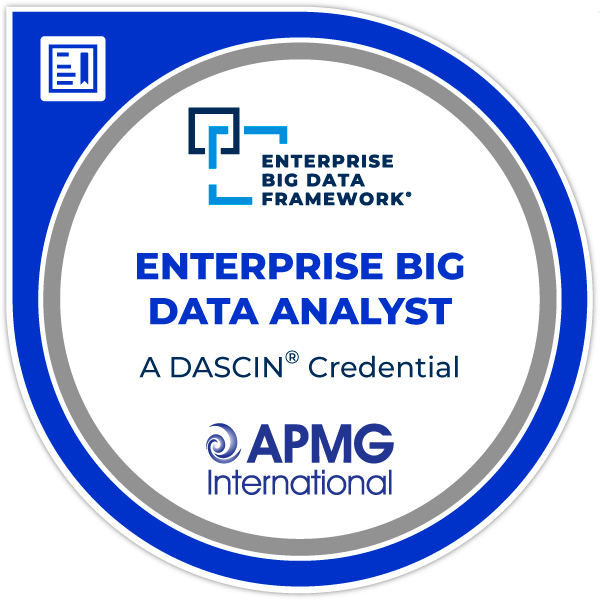
Testimonials & Course Reviews
The EBDA course provided me with a comprehensive understanding of advanced Big Data analysis techniques. The hands-on approach, especially with Python, allowed me to enhance my skills in predictive modeling and machine learning. This certification has proven invaluable in my role at IBM, where we frequently tackle large-scale data analysis challenges.
I enrolled in the EBDA course to refine my analytical skills and gain a more structured approach to Big Data analysis. As a Senior Business Intelligence Analyst at Siemens, I often work with cross-functional teams to derive insights from massive datasets, so the course content was highly relevant to my role. The curriculum covers essential Big Data topics, from exploratory data analysis to machine learning, and provides a thorough grounding in statistical inference techniques, which are invaluable for making sound business decisions.The course’s practical focus on real-world scenarios allowed me to apply the techniques I was learning immediately. I particularly appreciated the modules on data cleaning and wrangling – skills that are often undervalued in analytics but are absolutely crucial for ensuring the quality and accuracy of the analysis. The course also delves deeply into the various machine learning models for classification and clustering, providing the hands-on experience needed to implement these techniques confidently. I now feel equipped to handle a broader range of analytical challenges, such as predictive modeling, anomaly detection, and more complex clustering tasks.
The EBDA certification was an eye-opening experience for me. It gave me the tools to perform sophisticated data analysis and produce actionable insights. The course’s focus on statistical inference and machine learning models was particularly beneficial for the type of projects I handle at Accenture. I feel more equipped to make data-driven decisions.
I oversee large-scale data analysis projects, often dealing with terabytes of data every day. I enrolled in the Enterprise Big Data Analyst course to further hone my skills and stay ahead of the curve in the ever-evolving Big Data landscape. This course exceeded my expectations in every way. The curriculum is comprehensive and dives deep into both statistical and machine learning methods, offering a perfect balance between theoretical concepts and practical application. What I found most beneficial was the emphasis on statistical inference and machine learning models—such as classification algorithms like Naïve Bayes and Logistic Regression—because these are techniques I frequently apply in my role at AWS.
The course content, especially the programming exercises, was highly relevant and directly applicable to my daily work. It taught me new techniques for cleaning and wrangling large datasets, improving how I handle messy data before jumping into more advanced modeling. What really sets this course apart, however, is the emphasis on reproducibility. In Big Data, where decisions are often data-driven, having the ability to build reproducible models is critical, and this course gives you the tools to do that. After completing the certification, I felt more confident in my ability to select the right algorithm for a given problem and apply it efficiently.
The EBDA course has been a game-changer for my career. It provided me with a deeper understanding of the data analysis process and equipped me with practical skills to work with various machine learning models. The comprehensive approach made complex topics, such as clustering and outlier detection, much easier to grasp and apply in real-world projects.
The course gave me the confidence to handle advanced data analysis tasks. From data cleaning to model interpretation, every module was relevant to my work at SAP. I now feel more confident applying statistical inference techniques and machine learning algorithms to drive business decisions.


